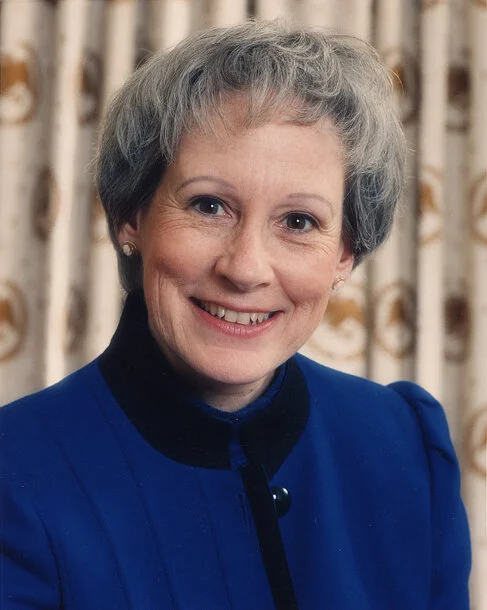Credit Photo: U.S. Senate Historical Office
When Nancy Kassebaum was serving in the Senate, bipartisanship was still possible in Congress. This may surprise many people today, when we hear of nothing but brutal and often irrational partisanship in the USA. When she was elected to serve, she shattered a glass ceiling, opening it up to dozens of women who followed her.
Kassebaum was born Nancy Landon on July 29, 1932, in Topeka, Kansas, into a political family. Her father, Alfred M. Landon, was the governor of Kansas and would be the only Republican governor to win reelection in 1934 because of the Great Depression. He would later win the GOP primary for President but lose the 1936 election to FDR. Her mother, Theo Cobb Landon, was an accomplished harpist and pianist. While her parents were Republicans, it was in the vein of Theodore Roosevelt’s branch of that party: progressive on social issues, aggressive internationally. Even after her father lost his bid for national office, he stayed active in state politics and friends with many national figures. At dinner time, everyone in the family talked about events, political and social. Her family laid the groundwork for Kassebaum’s interest in government.
Kassebaum earned a bachelor’s degree in political science from the University of Kansas in 1954, then went on to earn a master’s in diplomatic history at the University of Michigan in 1956. She met her first husband, Philip Kassebaum, while in Michigan, but the two moved back to Kansas where she was vice president of Kassebaum Communications, a company that owned several radio stations. She also served on the Maize School Board for a few years and as a 4-H leader. After 23 years of marriage and four children, the couple divorced in 1979, though they had been legally separated since 1975.
It was in 1975 that Kassebaum spent one year on the staff of then-Senator James Blackwood Pearson. In 1978, Pearson declined to run again, making that Senate seat open. Kassebaum ran for the nomination and won her primary over seven other candidates, six men and one other woman, then went on to win the general election with 54% of the vote under the slogan “A Fresh Face: A Trusted Kansas Name,” using her family’s political ties to her advantage, as is common for many elected officials. When she won her seat in the Senate, she found herself as the sole woman in that chamber of Congress. By the time she left office in 1997, nine women were in the Senate with her. Prior to Kassebaum’s win, 13 other women had been in the Senate, but all of them had been appointed to Congress to fill out either a father’s or a husband’s term. Only a handful (Caraway, Smith, and Neuberger) were then elected to continue to serve. Since her victory, 44 more women have become US Senators.
Over her three terms of service in the Senate, Kassebaum served on several committees, including: Banking, Housing, and Urban Affairs; Budget; Commerce, Science and Transportation; and the Special Committee on Aging. In 1980 she joined the Foreign Relations Committee, where she chaired the Subcommittee on African Affairs until 1987, though she remained on the standing committee until 1997. Having proven her ability to chair a committee, between 1995 and 1997 Kassebaum became the first woman to chair the Senate Committee on Labor and Human Resources and thus also became the first woman to hold such a position on a modern standing committee. She is often considered a moderate in her political beliefs and actions. She is best known for her work opposing apartheid in South Africa (contrary to most of her GOP colleagues), pushing for international arms control, reducing the budget deficit, and reforming liability laws. She split her voting record, sometimes siding with other Republicans on general budget issues and some military matters while also supporting women’s legal right to abortion and international family planning policies and opposing funding for Iraq’s Saddam Hussein. She never defined herself as a feminist and took positions that both pleased and angered many feminists, such as her stance for the Equal Rights Amendment but against extending the deadline for it to be supported by the necessary number of states; she did cosponsor the extension later when it was reintroduced in the Senate.
Bipartisanship was always important to Kassebaum. In 1992, seeing that the tone of the GOP was changing, she founded the Republican Majority Coalition. In the Senate she continued to vote for bills that she believed in and that she felt represented the best interests of the nation and Kansas. Crossing the growing divide between parties cost her seniority on committees after she voted for the 1994 Crime Bill promoted by President Clinton. She even worked with Senator Ted Kennedy on healthcare before she retired in 1997.
Retirement did not mean rest for Kassebaum. In 1997, she was given the Gene A. Budig Award from the University of Kansas (also called Kansas University/KU) for her continued work at the KU Alumni Board, the Ewing Kauffman Foundation, and the NCAA Foundation, all focused on education issues. KU also gave her the KU CLAS Alumni Distinguished Achievement Award that same year. She also held the Mary Louise Smith Endowed Chair in the Carrie Chapman Catt Center for Women and Politics at Iowa State University, returning from time to time to lecture and teach.
She served as co-chair of the Presidential Appointment Initiative Advisory Board in 2001 and lived in Tokyo with her second husband, Howard Baker, Jr., who was US Ambassador to Japan from 2001-2005. She has continued to work toward bipartisanship, fighting for campaign finance reform, serving on the Advisory Board for the Partnership for a Secure America and as a member of the ReFormers Caucus of Issue One, supporting both DNC and GOP candidates, as well speaking out against President Trump and even calling for his impeachment.
While it is true that in 2021 women make up a quarter of the Senate, women have a long way to go in that chamber. While Kassebaum showed that a woman could win a seat on her own, only 58 women have ever held a Senate seat, compared to 1,936 men; statistically, 0.03% of all US Senators have been women. Keep this in mind for forthcoming elections in your area.


